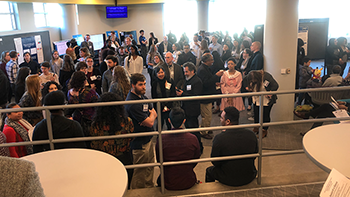Description/Abstract/Artist Statement
Introduction: It is common practice for healthcare professionals to make judgments about a patient's motivation based on their demeanor and compliance with therapy. Motivation is one of the predictors used to determine a stroke survivor's rehabilitation potential. There are several theories and constructs for motivation; however, there is limited research applying these concepts in stroke rehabilitation. Rehabilitation clinicians primarily rely on their clinical judgment and consult the evidence from related fields to identify the motivational needs of a stroke survivor. The objective of this study was to understand specific barriers to participation and identify motivational needs to sustain engagement in rehabilitation from the stroke survivor's rehabilitation experiences.
Method: This is a qualitative study involving six stroke survivors interviewed in two separate focus groups. The interview questions obtained information across seven themes: autonomy, competence, self-determination, self-efficacy, confidence, the external focus of attention, and relatedness. The interviews were videotaped, transcribed verbatim, then analyzed using a thematic approach.
Results: Preliminary analysis identified similar experiences for themes of relatedness, autonomy, confidence, self-determination, and competence. The analysis of the positive and negative experiences aligns to identify specific barriers and motivators for participation.
Discussion: The outcomes of this study identify barriers to participation and confirms the constructs of motivation important for participation in rehabilitation from a stroke survivor's perspective.
Faculty Advisor/Mentor
Rachel Johnson
Presentation Type
Poster
Disciplines
Other Analytical, Diagnostic and Therapeutic Techniques and Equipment | Other Rehabilitation and Therapy | Speech Pathology and Audiology
Session Title
Poster Session
Location
Learning Commons, Atrium
Start Date
2-8-2020 8:00 AM
End Date
2-8-2020 12:30 PM
Upload File
wf_yes
Included in
Other Analytical, Diagnostic and Therapeutic Techniques and Equipment Commons, Other Rehabilitation and Therapy Commons, Speech Pathology and Audiology Commons
From Their Perspective: A Qualitative Analysis of Stroke Survivor’s Motivation to Participate in Rehabilitation
Learning Commons, Atrium
Introduction: It is common practice for healthcare professionals to make judgments about a patient's motivation based on their demeanor and compliance with therapy. Motivation is one of the predictors used to determine a stroke survivor's rehabilitation potential. There are several theories and constructs for motivation; however, there is limited research applying these concepts in stroke rehabilitation. Rehabilitation clinicians primarily rely on their clinical judgment and consult the evidence from related fields to identify the motivational needs of a stroke survivor. The objective of this study was to understand specific barriers to participation and identify motivational needs to sustain engagement in rehabilitation from the stroke survivor's rehabilitation experiences.
Method: This is a qualitative study involving six stroke survivors interviewed in two separate focus groups. The interview questions obtained information across seven themes: autonomy, competence, self-determination, self-efficacy, confidence, the external focus of attention, and relatedness. The interviews were videotaped, transcribed verbatim, then analyzed using a thematic approach.
Results: Preliminary analysis identified similar experiences for themes of relatedness, autonomy, confidence, self-determination, and competence. The analysis of the positive and negative experiences aligns to identify specific barriers and motivators for participation.
Discussion: The outcomes of this study identify barriers to participation and confirms the constructs of motivation important for participation in rehabilitation from a stroke survivor's perspective.


